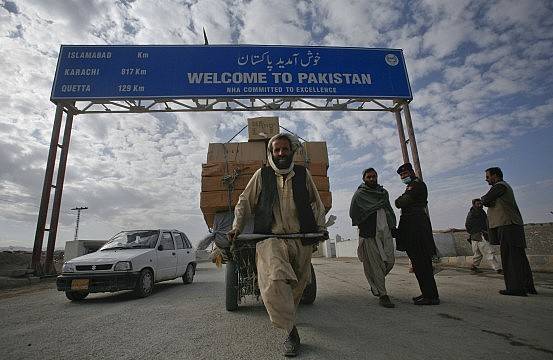Pakistan and Afghanistan, two inseparable brothers, have strong political, economic, ethnic, cultural and regional ties. The poorly managed 2,250 km long border is a source of concern for not only the international community, but also Pakistan, since it is creating a multitude of problems in the form of terrorism, drug trafficking and human trafficking for us. The futile border closure, that took place after a series of deadly terrorist attacks, was neither in the favor of Pakistan nor Afghanistan, and resulted in willingness to continue the peace dialogue - a necessary step to fetter extremism- following the London meeting. Pakistan must realize that it is not the border closure, a move that further exacerbated the stark contrasts, but a smartly formulated foreign policy consisting of a robustly administered border, cooperation against terrorism and strengthened bilateral trade, that will cinch a peaceful South Asia.
Cross-border terrorism is a concern for both Pakistan and Afghanistan. Both have adopted the culture of blaming the other for negatives without appreciating each other for the positives. Pakistan wants the Afghan government to take action against certain hardliners escaped in Kabul. Afghanistan, on the other hand has adopted a seemingly hawkish policy, by claiming that Pakistan is assisting Afghan Taliban against the Afghan government. Pakistan has hit hard in the aftermath of ‘Operation Ghazi’ launched by ‘Jamatul Ahrar’ killing numerous innocents at Lal Shahbaz Qalandar’s shrine, Awaran and Mohmand Agency. The tides of terrorism, which have annihilated Pakistan both economically and socially, can be receded if both sides agree to monitor and resolve the border issue as decided in the recent London Meeting.
Implications of the border closure
Border closure is neither in the favor of Pakistan nor Afghanistan, as it further deteriorated the already distorted relations between two neighbors. The unilateral border closing, intended to make Pakistan safe at a time when international players showed concerns to play PSL final in Lahore, gives an insight into numerous fallouts. First, the recent border closure has resulted in heavy financial losses for the traders and the cost could be estimated up to $100 million. The trade volume between Pakistan and Afghanistan stands nearly $2.28 billion annually. Pakistan, the top import origin and export destination for Afghanistan, is expected to lose its credibility as Kabul’s largest trading partner owing to strained political and security ties and frequent border barricades. Better border management is extremely important to validate the smooth influx of both people and goods between the two states.
Second, the border closure can give room for regional and international enemies to take advantage of the already crumbled relations. India, that is sponsoring terrorism in Pakistan through its consulates in Kabul, will become more violent owing to a cliff between the two neighbors. Moreover, India’s expansionist policy in the form of increased investment, infrastructural development and bilateral trade is a source of concern as Pakistan will no longer be able to seek “strategic depth” in Kabul in the case of any suspected war with India.
Third, Afghanistan can provide Pakistan a route to the mineral rich Central Asian countries. During the recent Heart of Asia conference, Modi called Afghanistan a “hub for strengthening the links of connectivity between South Asia and Central Asia”. Owing to the retrograded ties between Islamabad and Kabul and an integrated Indian-Afghanistan front, the probability of economic cooperation with CARZ has further downgraded.
Forth, CPEC is a ray of hope for Pakistanis. This humongous project worth $52 billion cannot see the light of dawn without peace and stability in Afghanistan. There is a need to implement the measures agreed in London talks pertaining to the continuation of a peaceful dialogue and holding of intelligence meetings to curb the menace of terrorism in order to ensure a stable Afghanistan and in turn a peaceful Pakistan.
What ought to be done?
Efficient border management is necessary to check menaces like extremism, terrorism and drug trafficking, but border closure is not a solution. There are three major areas in which cooperation between the two neighbors is merited to ensure stability. A) Border management and interdicting cross-border militant movement can be a joint priority for both the states to stop regional militancy. B) Pakistan can use its influence to nudge Afghan Taliban to have reconciliation with the Afghan government and C) Trade and commerce between Pakistan and Afghanistan can and should be expanded by keeping political conflicts separate from bilateral and transit trade.
The relations between Pakistan and Afghanistan have always been at odds and further aggravated in the aftermath of a series of terrorist attacks that led to the closure of the border between two states. The border has recently been opened knowing that salvation of both the states lies in peace. However, the tides of terrorism, which have annihilated Pakistan both economically and socially, can be receded if both sides agree to monitor and resolve the border issue as decided in the recent London Meeting.






